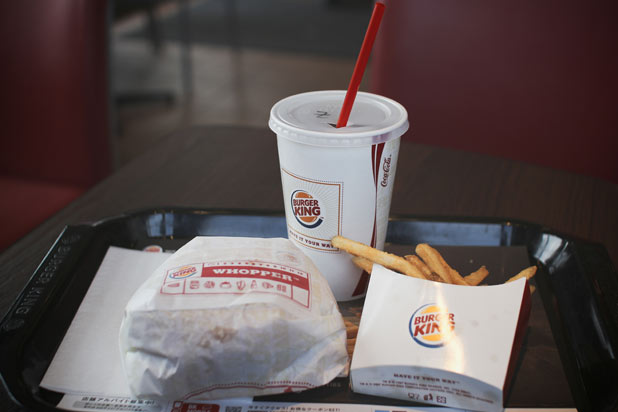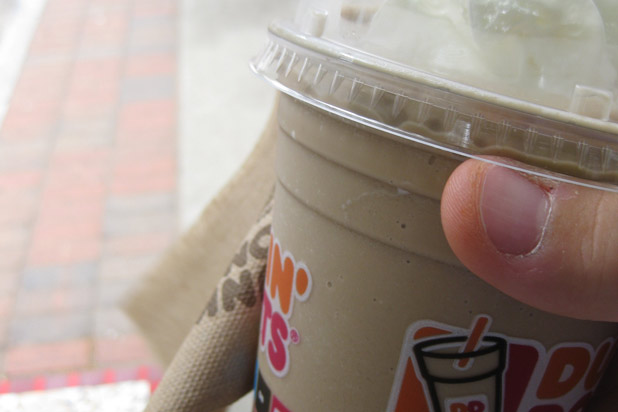These 10 Fast Food Items Are Still Loaded With Trans Fats
The good news is that just about every fast food chain is currently hard at work on removing trans fats from their menus. The bad news is that there are still menu items at just about every chain that are loaded with them. We've rounded up the foods that contain the most trans-fats at ten leading fast-food chains.
These Fast Food Items are Still Loaded with Trans Fats (Slideshow)
So what is trans-fat, exactly? Essentially, it's the type of fat that's created when hydrogen is added to the chemical structure of a fat, typically vegetable oil. The addition of hydrogen helps to make the fat (and therefore the food it's used in) more shelf-stable, preventing it from easily spoiling when left out unrefrigerated. Partial hydrogenation (the process of adding hydrogen to fat) also creates a semi-solid fat, which is necessary in order to prevent foods from melting at room temperature. Partially hydrogenated oil is also much cheaper than butter, lard, or other semi-solid fats like palm oil. Trans fats also take much longer to go rancid than traditional fats, making partially-hydrogenated oil a favorite frying oil for restaurants.
Trans fats actually occur naturally in animal fat and dairy, but at much smaller concentrations than the amount used in processed foods. Trans fats also have no nutritional value. While saturated fat (most commonly found in animal fat and cheese) and trans fats increase levels of LDL ("bad" cholesterol), trans fats actuallydecrease the level of HDL ("good" cholesterol) in the bloodstream, increasing the risk of heart disease. While it's impossible to completely avoid all trans fats due to their presence in nature, the National Academy of Sciences advises cutting them out of your diet as much as possible, and the best place to start is avoiding all foods with the phrase "partially hydrogenated" anywhere in the ingredients list.
So what exactly are the risks associated with eating too much trans fat? We're glad you asked! A diet high in trans fats can lead to high blood pressure, obesity, and heart disease. Studies have also indicated that increased trans fat consumption may lead to Alzheimer's disease, prostate and breast cancer, Type 2 diabetes, liver dysfunction, infertility, depression, and even aggression.
Last year, the Food and Drug Administration "declared war" on trans-fats, putting pressure on food manufacturers to phase out their use of the fat, and many are taking heed (for example, margarine and shortening used to be full of trans fats, but now the content is down to near-zero).
The American Heart Association recommends that we eat fewer than two grams of trans fats per day, but single servings of some of these menu items contain way more than that. And even if fast food companies remove trans fats from, say, their deep-fried offerings, it's still present in beef, so that big juicy burger will never be trans fat free, but it appears as if one day just about everything else on the menu will be. Until then, keep in mind that the following fast food items still contain trans fats.
10) Burger King: Whopper

The Whopper, Burger King's signature sandwich, contains 1.5 grams of trans fats. The more meat the higher the trans fat level, however, so if you decide to make it a Triple Whopper, that'll set you back a full four grams (not to mention 1,160 calories and 75 grams of fat).
9) Dunkin Donuts: Large Frozen Coffee Coolata with Cream

Even though donuts and biscuits have historically been loaded with trans fats, Dunkin' Donuts has done a great job of eliminating them from just about every menu item. Because trans fats occuer naturally in milk, though, there's no way to remove it from their creamy frozen beverages. Their Large Frozen Coffee Coolata with cream (instead of skim milk), for example, contains 1.5 grams of trans fats. And if you're curious, the only donut they offer with quantifiable trans fats is the chocolate caramel donut.
Click here to learn which menu items have the most trans fats at 8 more fast food chains.